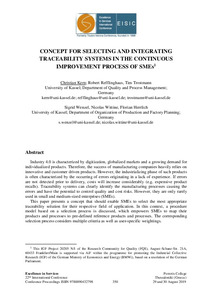| dc.date.accessioned | 2021-08-24T14:59:46Z | |
| dc.date.available | 2021-08-24T14:59:46Z | |
| dc.date.issued | 2019 | |
| dc.identifier | doi:10.17170/kobra-202105033802 | |
| dc.identifier.uri | http://hdl.handle.net/123456789/13159 | |
| dc.description | Proceedings veröffentlicht auf https://sites.les.univr.it/eisic/wp-content/uploads/2019/11 | ger |
| dc.description.sponsorship | This IGF Project 20205 N/1 of the Research Community for Quality (FQS), August-Schanz-Str. 21A, 60433 Frankfurt/Main is supported via AiF within the programme for promoting the Industrial Collective Research (IGF) of the German Ministry of Economics and Energy (BMWi), based on a resolution of the German Parliament. | ger |
| dc.language.iso | eng | eng |
| dc.rights | Namensnennung 4.0 International | * |
| dc.rights.uri | http://creativecommons.org/licenses/by/4.0/ | * |
| dc.subject | expensive recalls | eng |
| dc.subject | traceability of products | eng |
| dc.subject | traceability systems | eng |
| dc.subject | selection | eng |
| dc.subject | continuous improvement | eng |
| dc.subject | process optimization | eng |
| dc.subject.ddc | 670 | |
| dc.title | Concept for selecting and integrating traceability systems in the continuous improvement process of SMEs | eng |
| dc.type | Konferenzveröffentlichung | |
| dcterms.abstract | Industry 4.0 is characterized by digitization, globalized markets and a growing demand for individualized products. Therefore, the success of manufacturing companies heavily relies on innovative and customer driven products. However, the industrializing phase of such products is often characterized by the occurring of errors originating in a lack of experience. If errors are not detected prior to delivery, costs will increase considerably (e.g. expensive product recalls). Traceability systems can clearly identify the manufacturing processes causing the errors and have the potential to control quality and cost risks. However, they are only rarely used in small and medium-sized enterprises (SMEs).
This paper presents a concept that should enable SMEs to select the most appropriate traceability solution for their respective field of application. In this context, a procedure model based on a selection process is discussed, which empowers SMEs to map their products and processes to pre-defined reference products and processes. The corresponding selection process considers multiple criteria as well as user-specific weightings. | eng |
| dcterms.accessRights | open access | |
| dcterms.creator | Kern, Christian | |
| dcterms.creator | Refflinghaus, Robert | |
| dcterms.creator | Trostmann, Tim | |
| dcterms.creator | Wenzel, Sigrid | |
| dcterms.creator | Wittine, Nicolas | |
| dcterms.creator | Herrlich, Florian | |
| dc.subject.swd | Prozessoptimierung | ger |
| dc.subject.swd | Qualitätsmanagement | ger |
| dc.subject.swd | Rückruf | ger |
| dc.subject.swd | Supply Chain Management | ger |
| dc.type.version | publishedVersion | |
| dcterms.event.date | 2019-08 | |
| dcterms.event.place | Perrotis College, Thessaloniki, Greece | |
| dcterms.source.collection | Excellence in Services. 22nd International Conference. Conference Proceedings | eng |
| dcterms.source.identifier | isbn:9788890432798 | |
| dcterms.source.pageinfo | 350-363 | |
| kup.iskup | false | |
| dcterms.event | The 22nd "Excellence in Services" International Conference; EISIC | |


